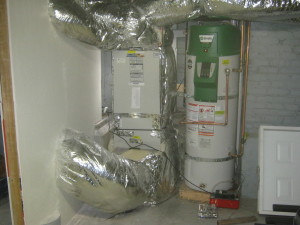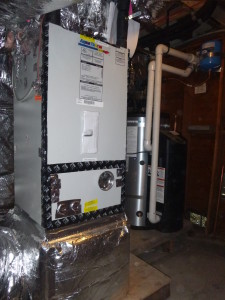Hydronics refers to the use of a liquid as a medium of heat transfer in heating or cooling systems.
Specifically, a Combined Hydronic Air Handler, often described as a “hot water furnace,” uses hot water to heat a home.
How does a Combined Hydronic Air Handler system work?
It uses two appliances in conjunction: a high efficiency water heater (ideally with a tank) and the hydronic air handler itself. When you turn on the heat, a small pump brings hot water from the water heater to coils inside the air handler. Air is warmed as it’s pushed over these coils, and then it continues into the duct system. Meanwhile the water heater is also producing hot water for normal domestic needs: showers, laundry, etc. A water heater should be chosen that has an appropriate capacity and recovery rate to meet all of these hot water demands simultaneously.
When designed and installed correctly, a hydronic system has many advantages.
1. You don’t need a furnace. This is good because:
- If two systems are rated to be equally efficient, then the simpler system is generally better. Less maintenance is required, and less things can go wrong. Despite the over-simplified efficiency ratings, hydronic air handler systems costs less to operate than a comparable gas furnace, provides more comfort and reduces the gas bill associated with normal water heating as well.
- Steady, even heating means comfort and efficiency. Air heated by a combined hydronic system doesn’t exceed 130 degrees F, while furnaces can go to much higher temperatures. Ideally, homes should be heated with mildly warm air, even less than 130 degrees. Warm air mixes into a room more evenly, stratifies less, and is much more comfortable.
- Very hot air can cause problems in a forced air system. It rises quickly and increases heat loss through the attic. Also, some research has shown that very hot surfaces (such as the exterior of a gas furnace) can decrease air quality by charring organic dust, which increases the level of irritants in the air.
- Although a properly installed furnace shouldn’t pose a significant combustion risk, a combined hydronic system removes that risk entirely. In this system, the only gas appliance needed is the water heater. If the water heater is sealed combustion, you’ve maximized your home’s safety with regard to HVAC.
2. Combined Hydronic Air Handlers are flexible, and can be fine-tuned much more accurately than a furnace.
- Oversized furnaces are a major efficiency problem in homes. Furnace energy output levels vary in large increments, which makes it difficult to find the perfect furnace for a home. Oversized units can cycle on and off frequently and put out air that is way too hot, while undersized units must run on a high setting for too long and may not achieve desired comfort levels. Either way you have a major efficiency loss, as well as a potential threat to the lifespan of the equipment (especially if oversized).
- Combined Hydronic Air Handlers, on the other hand, can be tuned exactly to a home’s needs. Steady, even heating provides high levels of both comfort and efficiency. Good ol’ water and its high thermal capacity!
3. Will a Combined Hydronic Air Handler work with air conditioning too?
- Yes indeed. New, correctly sized AC coils are attached to the end of the hydronic air handler. The model we often use comes with AC coils inside already. AC with a hydronic air handler works the same way it does alongside a furnace.
- The HVAC industry loves to put in gigantic oversized AC units as well as oversized furnaces. An oversized AC unit will not work with a correctly sized air handler as it will require a proportionately huge amount of airflow going over the AC coils to prevent them from freezing. Thus, when we install a hydronic system, we usually install a new, correctly sized (which almost always means smaller) AC unit as well.
4. Will a Combined Hydronic Air Handler work with a tankless water heater?
- Yes, though you will likely need one that modulates up to 150-200k btus to meet hot water demands (for example, taking multiple hot showers and doing laundry while the heater is on). However, even less powerful tankless water heaters should prioritize the shower over the air handler. This just means the house will go without heating during showers, which isn’t a big deal.
- Here at EPB we like to use a Navien© tankless water heater. For tank water heaters, we use the AO Smith Vertex© or the HTP Phoenix Light Duty©. The system works better with tank water heaters but can work fine with specific tankless units if no space is available for a tank water heater. All of them are Energy Star certified and have a 96%-98% combustion efficiency with an Energy Factor of above 0.90.
5. What if my water heater is located far away from where the air handler can go?
- This does result in a slight efficiency loss. However, if the pipes are well insulated, the difference is negligible.
6. How do I know if my contractor can work with hydronic systems? And what about maintenance?
- This is a very important question, as combined hydronic air handlers are still a fairly specialized technology. To ensure they are designed, sized, and installed correctly, you will need a home performance contractor who has experience working with them. As always, HVAC goes hand-in-hand with duct engineering, air sealing, insulation, and corresponding Manual J calculations for heating/cooling loads.
- Maintenance on these systems is simple, since there are few moving parts. The water heater is maintained just like any other. The hydronic air handler is just a fan, circuit board and a small pump. Parts are easy to replace if necessary.
- Overall, a correctly sized and well designed hydronic system will require much less future repair work than a typical oversized furnace. Simplicity and lower temperatures means less wear and tear.
[dropshadowbox align=”none” effect=”lifted-both” width=”640px” height=”” background_color=”#ffffff” border_width=”1″ border_color=”#dddddd” ]To find out if Hydronic is right for you, call (925) 363-4498 or e-mail info@epbuilders.com to speak to a technician, or schedule an energy audit.[/dropshadowbox]



can a heat pump hot water heater be used to provided hot water for a hydronic forsed air furnace
While away for 5 winter months, can I shut the main water valve and assume my hydronic furnace will function properly since the water needed is in a closed recirculating circuit and does not need to be replenished? Thanks